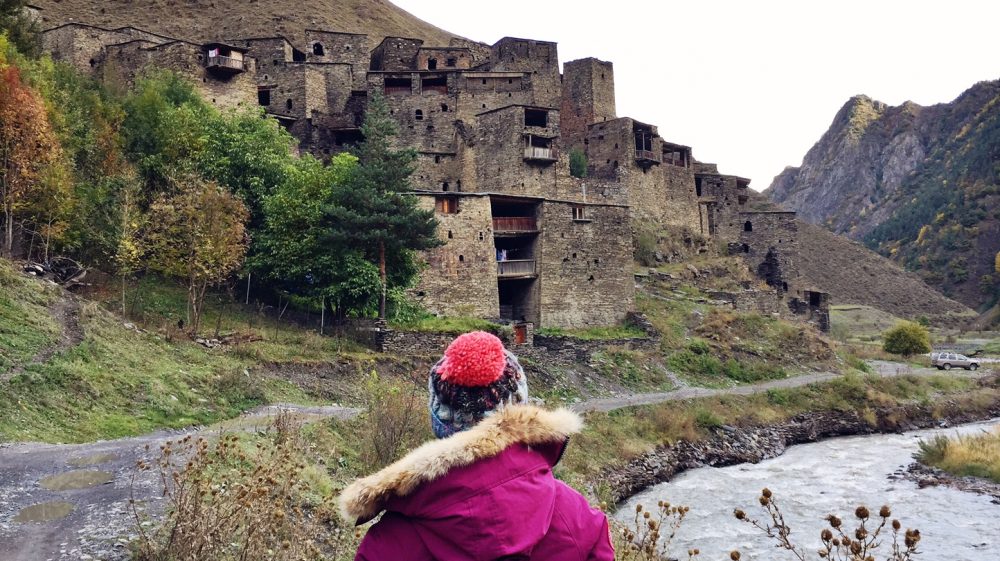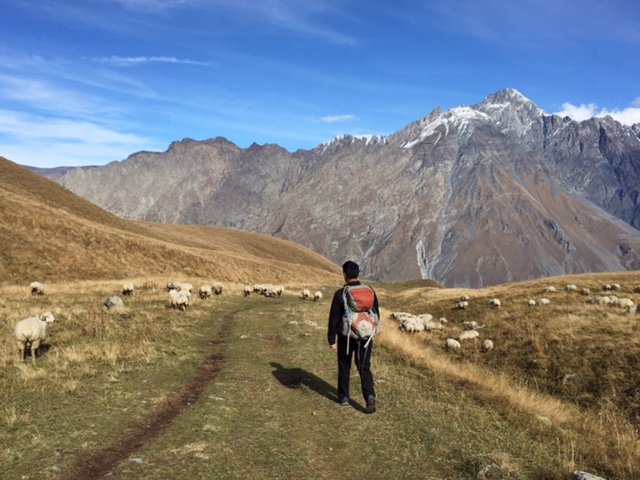Why Do You Want To Travel?
Reading Time: [est_time] When I read the article about Chanel Cartell and Stevo Dirnberger who left their advertising jobs and now fund their world travels by cleaning toilets, I asked Matt, "Why do you want to travel?" While

Reading Time: 3 minutes
When I read the article about Chanel Cartell and Stevo Dirnberger who left their advertising jobs and now fund their world travels by cleaning toilets, I asked Matt, “Why do you want to travel?” While I believe that travel can be inherently valuable—and I admire the couple’s determination and fortitude—I wouldn’t make the same choice and let health, career, and financial well-being take a back seat just to be able to scrape by and see the world.
For Matt, travel is an end to an end. As a child, he always dreamed of seeing the other side of the mountain. The only way to quench his thirst for adventure and aliveness, and to fuel his creative engine, is to put him on the road perpetually.
For me, travel is a means to an end. When I first committed to this journey, a few people asked if I am “finding myself”. Not at all, I wasn’t feeling remotely “lost”, there was no need to find anything. I loved my life in Singapore, my social circle, and my job. But I wanted to travel to expand myself—to open up new latitude for success while fulfilling my needs for freedom and lifelong growth. I had set out the goals to achieve financial- and location- independence and couldn’t see that happening soon enough if I had gone with the default choice of living in Singapore. So I chose a different trajectory: focus on building an investment portfolio and bootstrap a startup while on a round-the-world trip; and with that switch, I could instantly achieve a location-independent lifestyle and keep 100% of the returns on my productivity.
So why do you want to travel? Whatever your drivers are, travel should expand your calibre, enhance your well-being, or improve the quality of your life.
“Travelling is a fool’s paradise. Our first journeys discover to us the indifference of places. At home I dream that at Naples, at Rome, I can be intoxicated with beauty, and lose my sadness. I pack my trunk, embrace my friends, embark on the sea, and at last wake up in Naples, and there beside me is the stern fact, the sad self, unrelenting, identical, that I fled from. I seek the Vatican, and the palaces. I affect to be intoxicated with sights and suggestions, but I am not intoxicated. My giant goes with me wherever I go. ”
Ralph Waldo Emerson
Travel should not be an escape. It should be an expression of your life, no better and no worse than your life at home. If you are so displeased with any aspect of your life and where you live that you fantasize about getting away frequently, then it’s a wake up call to work on the indispensable parts of your life and not think about how to avoid reality or how to scrimp and save for the next vacation. There’s a difference between wanting a change in scenery or to gain new perspectives and needing to run away from, in Emerson’s words, your giant.
Travel only if you want to and if you genuinely enjoy it. It is perfectly fine if you don’t appreciate visiting new places or detest being on a plane. It is understandable that you feel your best at home. Packing and unpacking, spending hours in transit, and the uncertainty by dint of a foreign country can be exhausting. Don’t let the travel hustlers fool you into thinking that travel is an extension of wisdom. It can be but it doesn’t apply to everyone. Not everyone thinks diversity is the magical spice of life. Not everyone is interested to extrapolate their future developments from travel lessons, and not everyone can thrive in ambiguity or unfamiliar environment. The bigotry among the travel hustlers is like a crusade. Some people jump on the bandwagon of travel and think it is wrong to not enjoy travel, then they judge the people who don’t like to travel or travel differently from them. To think we often hear or say that travel opens the mind, the narrow-mindedness among some travellers are as mind-boggling as the unique places they boast about visiting. Going to “off the grid” places? Package tours are “for tourists”? Going to and eating at “a real local place”? Staying at guest houses because they are “more organic experiences”? Do those statements ring a bell? Come on. Travellers should feel honoured and privileged to have a glimpse into an understanding of the world that not everyone gets to see, instead of promoting snobbery.
Travel in your own skin and travel so you can be in your own skin. Ask yourself what is holding you back from experiencing life in its totality. By and large, we are products of our environments and influenced by prolonged exposure to our set of circumstances and cultures. Consider your comfort zone. Think about where you want to be emotionally, financially, intellectually, and spiritually. Then go out and search for the adventures, people, places, and sights that will help you unlearn your self-imposed limits and get you to the level of excellence that you want. When you focus on what matters to you, the budget travel or the dinner at a Michelin-starred restaurant, the luxury hotel stay or the penny-pinching night at a hostel, the famous monastery or the hippest cafe in town, the learning new language or the unlearning of your own cultural habits, the checking off landmarks, and counting number of countries visited may just become pointless.
As I looked through Cartell’s and Dirnberger’s website, I realised they too are on their ways to achieving their purposes. In one article, Dirnberger wrote that they started their journey to look for creative inspiration and it seems like now they have a consistent flow of it. Check out their creative portfolio here. Also as Cartell wrote, “There’s nothing quite like swapping million rand [the currency of South Africa] advertising budgets for toilet scrubbing to teach you about humility, life, and the importance of living each day as if it were your last.”
Character is built when we challenge ourselves. Inspiration is fuelled by an intentional course of action. As with travel, we need to proactively guide the course of travel and seek experiences that will spark creative thinking, push our limits, and fulfil our purposes. Don’t just sit around and wait for the proverbial apple to fall on the head. Both life and travel can be carried along on the prevailing winds, it may still be fun and it may be easy. But would it be valuable, would the journey be worth it?
“Originality only begins when we dare to be thought a little mad, when we allow our curiosity to be spontaneous, when we undertake the heroic effort of worrying a little less what the crowd and the guidebooks think. Part of growing up, and learning to travel well, means daring to take our own interests a bit more seriously.”
Alain de Botton
Hold on to the sense of wonder, Charine.
Related
Lost in The Moment or Lose the Moment?
How Travel Can Enhance Your Political Maturity


